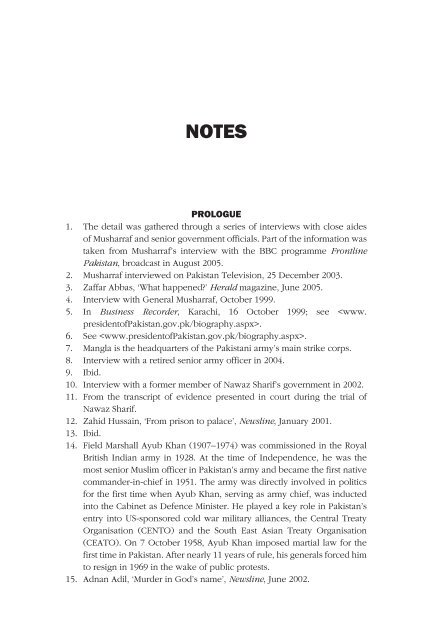Frontline Pakistan : The Struggle With Militant Islam - Arz-e-Pak
Frontline Pakistan : The Struggle With Militant Islam - Arz-e-Pak
Frontline Pakistan : The Struggle With Militant Islam - Arz-e-Pak
Create successful ePaper yourself
Turn your PDF publications into a flip-book with our unique Google optimized e-Paper software.
1.<br />
2.<br />
3.<br />
4.<br />
5.<br />
6.<br />
7.<br />
8.<br />
9.<br />
10.<br />
11.<br />
12.<br />
13.<br />
14.<br />
15.<br />
notes<br />
Prologue<br />
<strong>The</strong> detail was gathered through a series of interviews with close aides<br />
of Musharraf and senior government officials. Part of the information was<br />
taken from Musharraf’s interview with the BBC programme <strong>Frontline</strong><br />
<strong><strong>Pak</strong>istan</strong>, broadcast in August 2005.<br />
Musharraf interviewed on <strong><strong>Pak</strong>istan</strong> Television, 25 December 2003.<br />
Zaffar Abbas, ‘What happened?’ Herald magazine, June 2005.<br />
Interview with General Musharraf, October 1999.<br />
In Business Recorder, Karachi, 16 October 1999; see .<br />
See .<br />
Mangla is the headquarters of the <strong><strong>Pak</strong>istan</strong>i army’s main strike corps.<br />
Interview with a retired senior army officer in 2004.<br />
Ibid.<br />
Interview with a former member of Nawaz Sharif’s government in 2002.<br />
From the transcript of evidence presented in court during the trial of<br />
Nawaz Sharif.<br />
Zahid Hussain, ‘From prison to palace’, Newsline, January 2001.<br />
Ibid.<br />
Field Marshall Ayub Khan (1907–1974) was commissioned in the Royal<br />
British Indian army in 1928. At the time of Independence, he was the<br />
most senior Muslim officer in <strong><strong>Pak</strong>istan</strong>’s army and became the first native<br />
commander-in-chief in 1951. <strong>The</strong> army was directly involved in politics<br />
for the first time when Ayub Khan, serving as army chief, was inducted<br />
into the Cabinet as Defence Minister. He played a key role in <strong><strong>Pak</strong>istan</strong>’s<br />
entry into US-sponsored cold war military alliances, the Central Treaty<br />
Organisation (CENTO) and the South East Asian Treaty Organisation<br />
(CEATO). On 7 October 1958, Ayub Khan imposed martial law for the<br />
first time in <strong><strong>Pak</strong>istan</strong>. After nearly 11 years of rule, his generals forced him<br />
to resign in 1969 in the wake of public protests.<br />
Adnan Adil, ‘Murder in God’s name’, Newsline, June 2002.













